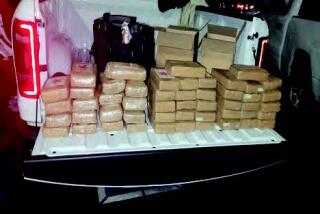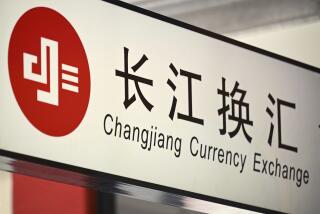NARCOTICS : Hong Kong Targets Drug Money Schemes : Trial will test a new law that forbids helping traffickers hide assets.
- Share via
HONG KONG — U.S. law enforcement officials have long argued that President Bush’s war against drugs cannot be won as long as foreign countries provide opportunities for drug dealers to hide their illegal profits.
It took an armed invasion to halt drug activities in Panama, which U.S. officials had accused of being the largest center of money laundering activities in the world. Now the British colony of Hong Kong, which is frequently mentioned as being the next largest, has turned to the courts in its first major case aimed at the wealth of an accused drug dealer.
“We’re a very attractive place to money launderers,” said J. C. Stuart McDouall, the police superintendent in charge of the Narcotics Bureau’s new Financial Investigation Group. “It’s a very cash-oriented society in the drug world. You can’t launder your own money, so there has to be a washing machine.”
Hong Kong is favored by money launderers because private companies here do not have to file financial statements, and there are no taxes on overseas earnings. Hong Kong Chinese now play an important link between ethnic Chinese opium sellers in Thailand and drug dealers in the Chinatowns of New York and San Francisco.
Early next month, two men are due to go on trial under a law enacted in 1989 that for the first time makes it a crime in Hong Kong to assist a drug dealer in hiding his illegal assets. The law provides for the seizure of the assets after a conviction has been obtained.
The case stems from a worldwide investigation into the discovery of a metric ton of heroin, which was found in bales of rubber on the Bangkok docks in February, 1988. It has led to a number of criminal indictments in the United States, including that of Khun Sa, a rebel leader in Myanmar (Burma) who is often described as the world’s largest dealer in opium, and of a Hong Kong man named Law Kin-man, who was arrested in March, 1989, and is awaiting extradition to the United States.
The two men going on trial in Hong Kong are Law’s younger brother and a business acquaintance. They are accused of hiding 168 million Hong Kong dollars, nearly $21 million, from Law’s operation. Law is not charged in the Hong Kong case.
In a separate case, Law’s wife is under arrest in Australia on charges of hiding another $20 million there in real estate.
On a conference table in the financial squad’s office is an immense chart, showing how just two payments were hidden in the labyrinth of Hong Kong’s financial network. Each payment was laundered 400 times by such devices as buying and selling gold, foreign currency and real estate before being paid into a dummy corporate account.
“We have the documentary evidence of each transaction to prove the paper trail from one end to the other,” said McDouall.
Detective Chief Inspector Kenny Ip, who is an accountant by training, explained that Law would ship narcotics to New York, for example in marble furniture used by Chinese restaurants, then travel to the United States and collect the money.
Ip said Law had hired groups of Chinese to visit banks in lower Manhattan, where they bought stacks of $1,000 money orders with cash, which were then sent by commercial courier to Hong Kong. Cash transactions under $10,000 do not have to be reported to U.S. authorities.
Ip also said that Law’s men made extensive trips to Atlantic City casinos, where they bought chips for cash and then exchanged them later for checks, which were also shipped to Hong Kong.
From notebooks and ledgers seized in the case, Ip said the Hong Kong police estimated that Law earned $60 million in just two years.
“The sad thing is we can see only one man in this whole group,” Ip said. “There can be many Law Kin-mans walking around New York.”
The United States and Hong Kong are currently negotiating a bilateral agreement that would allow each government to exchange court orders. This would mean that an order to seize assets issued in New York, for example, could be enforced in Hong Kong, and vice versa.
Meanwhile, McDouall said he was calling on financial institutions in the territory to pay particular attention to suspicious transactions and notify the police.
More to Read
Sign up for Essential California
The most important California stories and recommendations in your inbox every morning.
You may occasionally receive promotional content from the Los Angeles Times.













